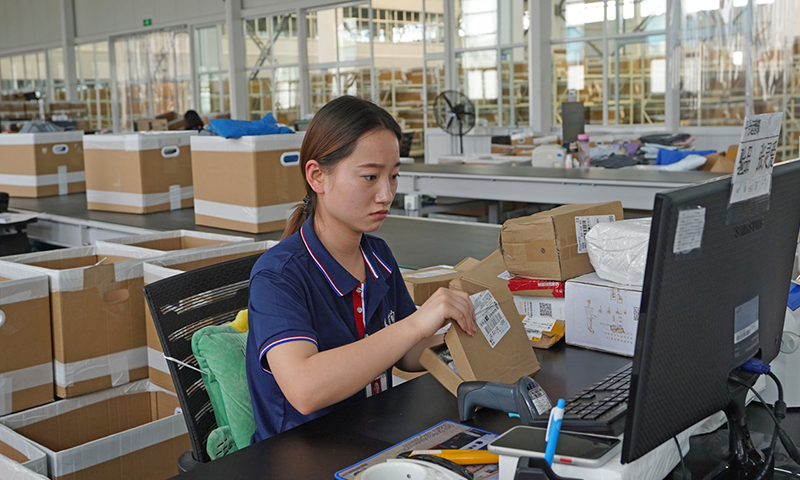Yuan internationalization push will blunt financial decoupling: CSRC official
Source:Global Times Published: 2020/6/22 19:19:39

An employee sorts and packages e-commerce orders at a cross-border trade company in Rongcheng, East China's Shandong Province on Tuesday. Offical data showed China's exports rose 1.4 percent year-on-year in yuan terms in May, while imports fell 12.7 percent. Photo:cnsphoto
China will have greater ability to withstand a financial "decoupling" if the nation makes more progress in globalizing the yuan, Fang Xinghai, vice chairman of the China Securities Regulatory Commission (CSRC), said on Monday.The yuan's internationalization has made strides, Fang said during the Caixin Summer Summit 2020 in Beijing, citing the currency's inclusion into the IMF's Special Drawing Rights basket in October 2016 and the launch of the yuan cross-border payment system in Shanghai in October 2015.
The nation began its yuan push in July 2009, when a yuan trade settlement program underwent a trial in Shanghai. But more will have to be done, Fang stressed.
The Chinese government and individuals hold a huge amount of assets overseas, mostly denominated in the US dollar. The US Federal Reserve's monetary policy stance tends to subject dollar assets to significant uncertainty, Fang said, and maintaining the value of China's overseas assets is inseparable from the yuan's internationalization. If China's overseas assets were denominated in yuan, it would eliminate such concerns, he said.
China's monetary policy, financial opening-up and the development of its financial sector are all influenced by the global monetary and financial systems, which could face substantial uncertainty arising from the US Fed's monetary policy, Fang added.
Most of the nation's companies and financial institutions rely on the US dollar payment system to do international business, but there are worries about the security of such payments.
If the yuan's internationalization is not pushed simultaneously with the Belt and Road Initiative (BRI), which is primarily conducted in foreign currencies, the BRI's momentum might be held back, Fang pointed out.
Fang's remarks highlighted the urgency of promoting the yuan internationalization, economists said.
The rise of the US dollar, which replaced sterling as the world's reserve currency, was a long-term process that spanned the first and second world wars and was facilitated by multiple historical coincidences, said Tang Jianwei, chief macro analyst at the Financial Research Center of the Bank of Communications.
Those conditions don't apply now, so China needs to follow a more practical path, meaning it needs to lift barriers to settle and invest in the yuan, Tang told the Global Times on Monday.
The yuan's position fell one spot to the sixth most active currency for global payments by value in April, with a share of 1.66 percent, according to a monthly yuan tracker global transaction services organization SWIFT sent to the Global Times. The US dollar remained No.1 with a 43.37 percent share.
Yuan payments shrank 25.09 percent month-on-month by value, compared with a decline of 16.56 percent for all payments currencies.
And, the Facebook-backed Libra cryptocurrency envisions becoming a global anchor currency against a basket of major currencies and could potentially replace the US dollar as the next leading reserve unit, Tang said. If that vision comes to pass, the yuan's global push would be undermined.
Advancing the yuan's global push could mean advancing its regional use, preferably among members of ASEAN, which overtook the EU as China's top trading partner amid the coronavirus outbreak, Tang said.
In the words of former central bank governor Zhou Xiaochuan, the yuan's internationalization will gradually proceed if reform and opening-up is well in the works.
Speaking at the summer summit on Monday, Zhou, currently president of the China Society for Finance and Banking, warned against a rush to liberalize the yuan.
Describing the yuan's global push as a long-term and gradual process, which is largely linked to China's economic and trade growth and the nation's push to deepen reform and opening-up, Zhou called for greater courage and boldness to press ahead with reforms for the yuan to gain more international clout.
Global Times